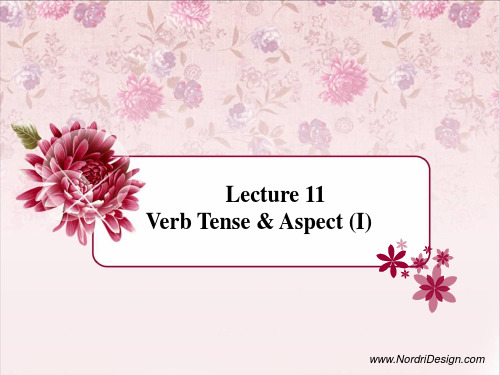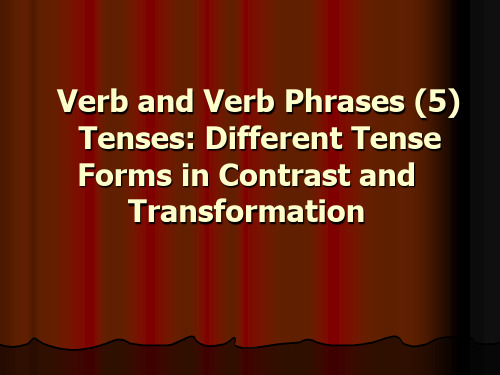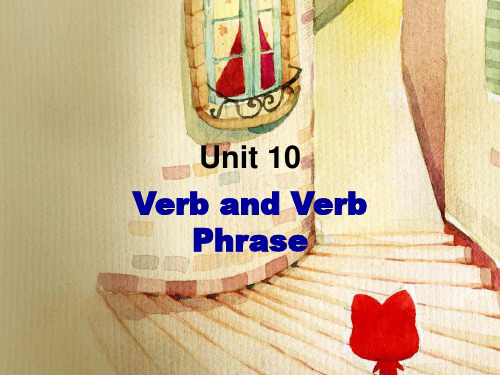Lecture 10 Verb and Verb phrases(课上用)
Lecture10词语搭配、语法形式与翻译

注:关键搭配——application of …
2) Challenges being addressed by modern environmental biotechnology range from the search for microbes that will reduce acid rain by removing sulfur from power coal to the biological production of biodegradable plastics.
长期咳嗽或嗓音嘶哑可能是肺癌或喉癌 的征兆。
3) There are a number of websites that can help you calculate your carbon footprint, or the quantity of carbon dioxide (greenhouse gas) that is produced by your choices of food, heating, travel, and other activities.
Hale Waihona Puke 1) A significant portion of the human population nowadays suffers from arthritis or inflammation of the joints.
目前相当一局部人群患有关节炎。
2) A persistent cough or hoarseness may indicate either lung cancer or cancer of the throat, known as laryngeal cancer.
Lecture 10 Verb and Verb Phrase 英语语法教学课件

Classification of verbs ( I )
1) Main verbs and auxiliaries
•a) Primary auxiliaries
be, do, have
Auxiliary be, is usually used to help the main verb to form the progressive aspect or the passive voice.
The fish is fresh from water. You don’ห้องสมุดไป่ตู้ have to smell it. The milk is going bad. It smells. This dish smells delicious.
Classification of verbs ( I )
3) Dynamic verbs and stative verbs
Classification of verbs ( I )
2) Transitive verbs, intransitive verbs and linking verbs
b) Intransitive verbs •Intransitive verbs do not require an object:
This rule applies to ( = is applicable to) everyone. French differs from ( = is different from) English in having gender for all nouns. The auditorium holds ( =has the capacity for) 2000 people
华南师范大学英语专业大二语法课8-Verbs(1)

Verbs
Part One FINITE VERB PHRASES I. Main Verbs (Full Verbs )
1. transitive, intransitive and linking verbs 2. regular and irregular verbs 3. dynamic and stative verbs 4. compound verbs
student.) • I have a ticket. (* I am having a
ticket)
Progressive aspect for be:
• Tom isBiblioteka being foolish.(= is talking or acting foolishly now)
• The children are being quiet. (= are playing quietly now)
• 4 types of time: present, past, future, past future
• 4 aspects: zero aspect (simple), continuous, perfect,
continuous perfect
• Number of Tenses = 4 x 4 = 16 (tenses)
link. v. + n.: • The actor looked his part. • He died a heroic death.
link. v. + adv.: • They kept together in the struggle. • The girl flushed up at the words.
Lecture_3动词的时和体

Three sub clauses:
I hope… I bet… see to it… make sure… make certain… if / when… I hope you have a good time. = I hope you will have a good time. I’ll make sure you don’t get lost. =…you won’t get lost. If it is fine tomorrow, we will go to the countryside
Alice tells me you’re entering college next year. I hear poor old Mrs. Smith has lost her son.
tell, say, hear, learn, write
b. Historic Present: as a device of story-telling and news reporting to add vividness to the description
See P13
Timeless Present Eternal Truths Proverbs Scientific facts
Honesty is the best policy. A rolling stone gathers no moss [mɔs]苔藓;泥沼.滚石不生苔; 朝东暮西,一事无成 London stands on the River Thames. Note: This use of the simple present mostly applies to Stative Verbs See P13
c. Some formal declarations:
lecture用法最全详解(含习题)

2.lecturelecture /ˈlektʃə(r)/ 词频4n. 讲座;讲课;教训. vi. (开)讲座;讲课. vt. 训斥派:lecturer 词频2 n.演讲者;(大学)讲师①高义频vi.&n.(尤指大学中的)讲座;讲课;演讲go to/attend a lecture 听讲座deliver/give a lecture做讲座a lecture on/about 关于……的讲课/训斥e.g. He lectures on literature at Manchester University. 他在曼彻斯特大学教文学。
②低义频vi.&n.教训;训斥lecture sb. about/on...因……训斥某人give sb. a lecture 给某人一个教训e.g. He’s always lecturing me about the way I dress. 他总是对我的穿着说三道四。
e.g. I know I should stop drinking-don’t give me a lecture about it.我知道我该戒酒,别教训我了。
1.单词拼写(1)I went to the ___(讲座) he gave in the hall.(lecture)(2)He learned a ___(教训)from this thing-he should stop smoking for his health.(lecture)(3)Professor Smith will give a l___ in Fudan University this evening about the history of English.(lecture)(4)She suffered a bad cold. As a result, she missed the ___(讲座) she liked very much.(lecture)(5)She preferred that we should have the discussion right after the ___(讲座).(lecture)(6)Please stop___(lecture) me! I know I should quit smoking.2.语法填空(1)The ___ (lecture) spoke very clearly so that we could hear every word.(lecturer) 3. 完成句子(1)He ___ ___ ___ ___time management to first-year students___ ___ ___ ___.他在报告厅给一年级学生做关于时间管理的讲座。
Lecture 10 Verbs

Auxiliary v. (aux. )
Di-transitive v: show, tell … 1.1. Transitive Verbs
Mono-transitive v: believe, …
Complex transitive v: think …
Note: 1. Vt.
vi :
with passive meaning
Current ~: be, appear, feel, look, taste …
1.2. Link verbs Resulting ~:become, fall, get, grow, turn… Continuous ~:keep, remain, lie, stay Primary:be, do, have:no lexical meanings 1.3. Auxiliaries Modal: can, may, will, shall … Semi-: have to, seem to, happen to… 2. According to lexical meaning: Dynamic Stative
NOTE: Stative verbs: not used in progressive aspect Exception: verbs of bodily sensation 除了第六种外,静态动词通常不能用于进行体,但有时可 用,这时意义上已被解释为含有动作意味,或者说已转换 为动作动词。此时,强调动作过程或未完成的状态。 He is being a good boy today. (= is behaving like…) We are having a good time. (= are enjoying…)
George is resembling his father more and more as the years goes by. Food is costing more since devaluation.
英语语法教程13.Verb and Verb Phrases (5) Tenses Different Tense Forms in

13.4 The simple past and past progressive
A) When the simple past and past progressive are used to refer to a certain activity, the former denotes “completion”, while the latter indicates “incompleteness”. B) Note the usual collocation of the simple past or past progressive with “as”, “while” or “when”.
B) The simple present indicates something true, whereas the simple future refers to one’s supposition or judgment. C) The simple present is usually used to refer to a future event in an “if” clause; when the simple future form is used in such a clause, it sounds more moderate and more polite.
13.7.3 Transformations caused by the shift of direct speech to indirect speech A) The formula in 13.7.2 is applicable here. B) Apart from the transformations in various tense forms, other changes in pronouns, determiners, time and place terms, etc. will take place accordingly.
章振邦《新编英语语法》Lecture 10课件

P111
Stative verbs
states. Stative verbs are verbs that refer to present or past states. They are not normally used with the progressive aspect except meaning. in certain cases where there is a transfer of meaning. They can categories: be subclassified into 4 categories:
P113
Classification of Verbs
Finite Verb Finite Form P116 Non-finite Verb Non-finite Form Grammatical Form Regular Verb P117 Irregular Verb
Main Verb (Notional Verb)
Stative verbs
iv) The 4th subclass includes verbs that refer to a feeling, a state of mind or an opinion, such as assume, believe, consider ( = think), detest, fear, hate, hope, imagine, know, like, love, mean, mind, notice, prefer, regret, remember, suppose, think, understand, want, wish, etc.:
The lights went out. (S + V) He put on his coat and went out. (S + V + A) Mary came in with the coffee. (S + V + A + A) The bomb went off with a deafening crash. (SVA) He came out with an extraordinary story. (SVO) P115
- 1、下载文档前请自行甄别文档内容的完整性,平台不提供额外的编辑、内容补充、找答案等附加服务。
- 2、"仅部分预览"的文档,不可在线预览部分如存在完整性等问题,可反馈申请退款(可完整预览的文档不适用该条件!)。
- 3、如文档侵犯您的权益,请联系客服反馈,我们会尽快为您处理(人工客服工作时间:9:00-18:30)。
Features:
2014-6-16
A New English Grammar
9
Semi-auxiliaries
Features:
have to , seem to
1. help the main verb to form the complex verb phrase and express the modal meaning
2014-6-16 A New English Grammar Exercise 2 7
• Complete the following sentences by using the right form of to have (have, has, had). 1) Jack_____fun at the party last Saturday. had 2) I'm sorry, but I have ____ to go now. 3) You have ____ ever been to Canada? 4) Dave____ has passed his driving test. 5) Can we _____ have the bill, please? 6) The match ____ had already started when we arrived. 7) They _____ had breakfast at 6:30 this morning. 8) Do you have ____ a brother? has time. 9) My boss never ____ 10) Doris has ___ been waiting for Pam for 20 minutes now.
2. when preceded by other auxiliaries, function as main verbs I have to buy a new car. I don’t have to ew English Grammar
10
(2) Transitive verbs, intransitive verbs and linking verbs
Main verbs can be divided into transitive verbs, intransitive verbs and linking verbs in accordance with whether or not they must be followed by obligatory elements functioning as complementation and what kind of elements that must follow.
I can’t find my boots. I find it difficult to believe you. Please find Mary her dog. The jury found against the defendant. 陪审团作出了对被告不利的判决。
2014-6-16 A New English Grammar 12
2014-6-16 A New English Grammar 8
Modal Auxiliaries
thirteen modal auxiliaries including some past tense forms
can/ could, may/ might, will/ would, shall/ should, must, ought to, dare, need, used to
win basic meaning of phrase
Main Verbs
3
three categories:
primary auxiliaries be, do, have modal auxiliaries
can/ could, may/ might, will/ would, shall/ should, must, ought to, dare, need, used to, have to , seem to
Lecture 10 Verb and Verb Phrase
2014-6-16
A New English Grammar
1
2014-6-16
A New English Grammar
2
1) Main Verbs and Auxiliaries
Why so divided? According to
These verbs normally admit of both the progressive and the non-progressive aspect. With momentary verbs, the non-progressive form indicates a single movement and the progressive form a repeated movement.
2014-6-16 A New English Grammar 11
注意:大多数主动词都有跨类现象。
Cotton feels soft. He felt in his pocket for the key. Suddenly I felt an insect crawling up my leg.
2014-6-16 A New English Grammar 4
• • • • • • •
The superman is singing.
He was sent to England.
Does he like his wife? He did love his wife. He has been to New York.
1. express modal meanings 2. past tense forms do not necessarily express past time 3. In a finite verb phrase, we can use only one modal auxiliary which is invariably followed by the bare infinitive or the base form.
a) Dynamic verbs Dynamic verbs can be sub-classified into three categories: durative verbs (drink, eat, read, play, talk, work, run, walk, fly, rain …), momentary verbs (close, open, knock, jump, put, hit, take out…), and transitional verbs (转态动 词)(become, get, grow, change, turn, arrive, leave …)
do negative meanings or to form questions some times the emphatic affirmative have the perfective or the perfective progressive aspect.
Exercise 1 Observe the following sentences and point out which ones of the blue words are primary auxiliaries and which ones are not.
Distinguish the categories of the blue verbs:
1.The fish is fresh from water. You don’t have to smell it. 3.The milk is going bad. It smells. 4.This fish smells delicious.
different roles played in the formation of verb phrases
I will win this competition.
will grammatical and modal meanings of phrase Auxiliaries
2014-6-16 A New English Grammar
2014-6-16 A New English Grammar 14
Some verbs can be both durative and momentary: e.g.: He is writing an article. (Durative) He wrote the letter “e” on the board. (Momentary)
2014-6-16
A New English Grammar
5
primary auxiliaries
be, do, have Features: no lexical meaning with grammatical functions / meanings: be the progressive aspect or passive voice.
semi- auxiliaries.
happen to, chance to, bo to, be sure to, be about to, appear to, come to, be apt to, be certain to, fail to, get to, tend to, be bound to, be going to, turn out to be (un)likely to have got to, had better, had best
Monotransitive I teach English. I gave him a book. Transitive verbs Ditransitive Complex transitive We elected him our monitor. Intransitive verbs He has arrived. We are waiting. Sensation verbs: feel, taste, smell, sound Linking verbs Present state: be, look, appear, seem State-changing verbs: go, become, grow, fall, turn
